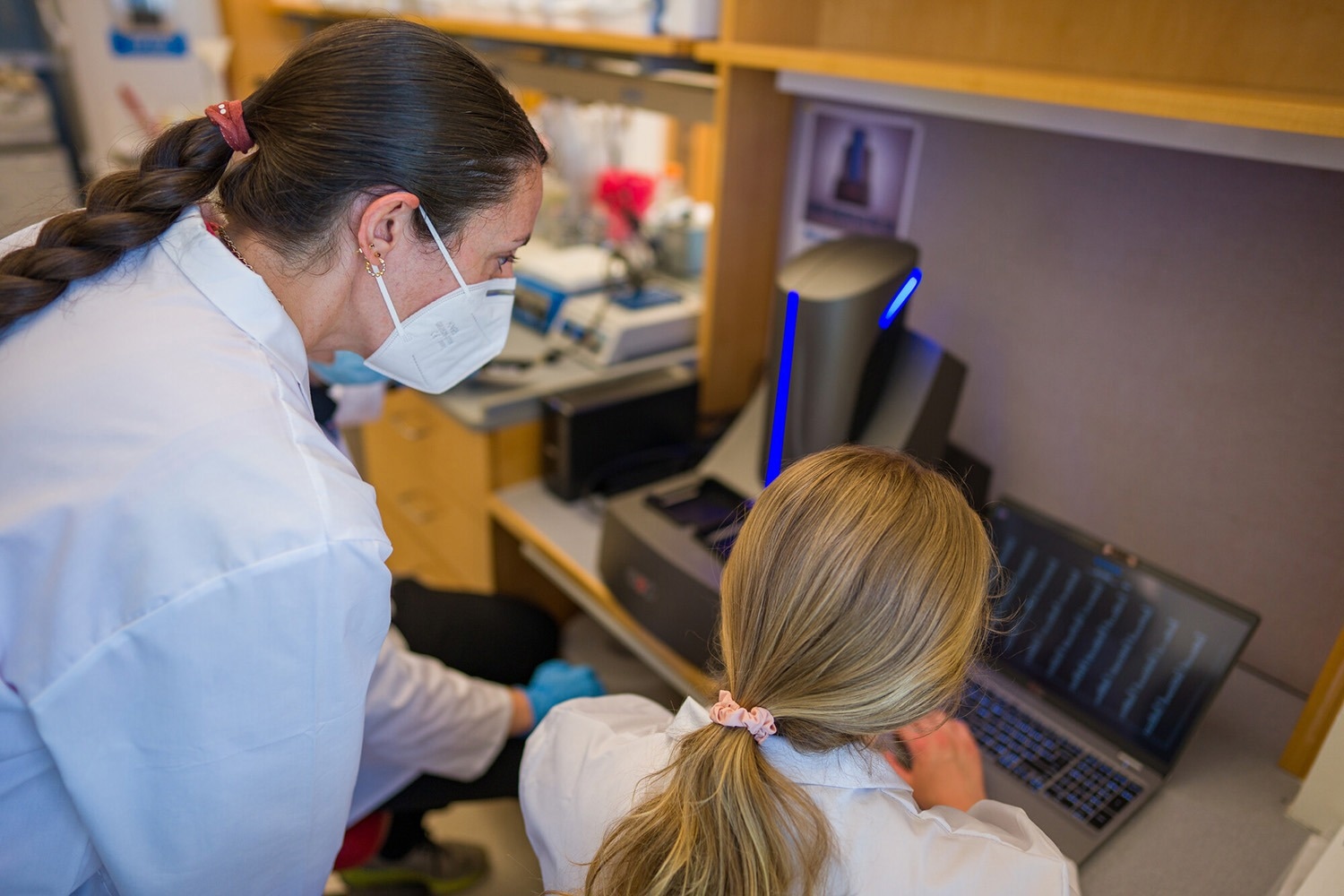The U.S. obesity epidemic continues to have profound impacts on individuals’ health and socioeconomic well-being. Hispanic communities—constituting close to 19% of the total US population and making up the second-largest population in New Hampshire (and one of the fastest growing ethnic minority groups in the state)—are particularly vulnerable, with 42% suffering from obesity, 77% being overweight, and many facing associated chronic diseases like type 2 diabetes. Research from the New Hampshire Agricultural Experiment Station is seeking to identify and quantify health outcomes across the interrelated factors of food access, fiber intake and gut microbiota in New Hampshire’s Hispanic communities, and offer Granite State farmers better insights about new potential local market opportunities.
 Station scientist Maria Carlota Dao (left) and research assistant and doctoral student Brandy Moser ‘23G work in Dao’s lab. Image Credit: University of New Hampshire
Station scientist Maria Carlota Dao (left) and research assistant and doctoral student Brandy Moser ‘23G work in Dao’s lab. Image Credit: University of New Hampshire
“The Hispanic/Latino population in the U.S. is very diverse from a cultural and sociodemographic perspective,” described Station scientist Maria Carlota Dao. “In New Hampshire, this population is rapidly growing—but we lack comprehensive information about the health and nutritional needs of Hispanics and Latinos in N.H.”
Dao, an assistant professor in the agriculture, nutrition, and food systems department at the UNH College of Life Sciences and Agriculture, is particularly interested in the role of fiber intake. Fiber, an essential component of a healthy diet, undergoes fermentation by the gut microbiota, resulting in the production of metabolites—small molecules that are byproducts of microbial metabolism—that play a crucial role in human metabolism and appetite regulation.
The study, which will leverage the deep community relationships developed by UNH Cooperative Extension specialists, will involve working with Hispanic adults aged 18-55 years with either a healthy or high body mass index and who reside in households eligible for the Supplemental Nutrition Assistance Program (SNAP)—a federal program that provides food benefits to low-income households. The research team will assess food insecurity, dietary intake and gut microbiota measures, all of which have been validated to assure accurate data collection for Hispanic populations. The researchers will also collect blood samples to evaluate how hormones involved in glucose regulation, hunger and satiety respond to the consumption of a meal.
“This study will generate unprecedented information on the interplay between diet, the gut microbiome and human health in Hispanic/Latino adults,” Dao said. “Furthermore, it will reveal opportunities for our food systems and nutrition assistance programs to better serve the state’s Hispanic/Latino communities.”
Dao hopes that the research results will help develop effective and accessible lifestyle interventions for weight management. The findings also have the potential to better inform local food producers about the types of high-fiber foods that may be in demand, enabling Granite State farmers to access more robust markets while better serving the region’s growing Hispanic population.
The research is supported by members of UNH Cooperative Extension including, Amy Hollar, associate state specialist; field specialist Rebecca Betts; SNAP-Ed program manager Zeanny Egea Alvarado and SNAP-Ed teachers Awilda Muniz and Grace Tavares. As new evidence-based interventions are learned from this research, Hollar and her team will partner with the state’s Hispanic communities to provide programs and resources.
Ultimately, we’ll be able to determine the effectiveness of the tailored nutrition by assessing behavior changes of the populations we work with. We can also eventually make these interventions available to other states for use in their SNAP-Ed programs and really highlight the success of culturally tailored nutrition.”
Amy Hollar, Associate State Specialist
You can learn more about Dao’s Fiber and Food Insecurity Research STudy (FIRST) on her lab website.